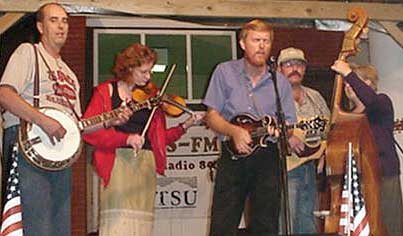A Country Rag Gas Lamps & CobblestonesDecember 2000 |
 graphic: Gates
graphic: Gates
From Sylva NC, Gary Carden writes and tells and teaches Appalachian experience. Teller by Gary Carden |
|
I've always been partial to books by storytellers, especially when they
are warm and intimate autobiographies. The Importance of Pot Liquor
is especially gratifying,
and at the time that it was written, Jackie Torrence was in the catbird's
seat.
Certainly, the author knew she had come a long way from a storyteller at the
High Point library to NAPPS, the Lincoln Center, the Kennedy Center and the
keynote speaker at the International Children's Festival. Her book is an
acknowledgment of those who shaped her life and inspired her along the way. Jackie's metaphor is pot liquor - the juice in the pot that is composed of all of the other juices, a rich blend of collards, beans and pork, along with ancient traces of herbs and the potent remains of summer soup. In Jackie's culture, pot liquor always had a magical ability to heal and sustain. Children and adults who had been struck down by disease or personal misfortune could be restored by a draught of ... pot liquor. Jackie perceives herself like that. She is the sum of all those who came before, and her gift - the stories that she tells of whimsical relatives, ghosts and Br'er Rabbit - are the essence of all the stories that have gone before. In telling them, Jackie sustains and bolsters us. She is pot liquor. Shortly after the publication of The Importance of Pot Liquor, Jackie's health took a turn for the worse. Suffering from diabetes and lacking any effective recourse to medical care, her condition grew worse and she suffered a stroke that left her demoralized and weak. At her last appearance at Jonesborough's National Storytelling Festival, she was unable to perform and returned home to Salisbury, North Carolina with an uncertain future. Recently, a group of concerned admirers, unable to contact Jackie, set out to locate her. They found her in the Brightmoor Nursing Home in Salisbury. Even by a conservative judgment, the conditions at Brightmoor are deplorable - at least, those described by Jackie's friends are daunting. Word was quickly circulated by the initial visitors, and in the ensuing weeks, friends and representatives of regional storytelling organizations visited Blackmoor and reported what they found there: the stench of waste, patients wandering the halls, wheelchairs everywhere, an absence of therapy and a despair that was almost palpable. Jackie's treatment seemed to consist of sedation. Certainly, she slept a lot. On oxygen, she stood and walked with difficulty and could not cross a room (when awake) without assistance.
|
Everyone who visited Brightmoor came away shocked by what they saw. One
visitor noted "Most of the folks in the hallway had ten to thirty years on
her [Jackie] and were hanging in for the last act of a Dickensian drama."
Visitors also noted that Jackie seemed to revive and become "renewed" with
the succession of visitors that continued to arrive. I guess you might say
that she was improving due to a steady diet of pot liquor. It now looks like Jackie's dilemma will have a happy ending. She is no longer in the nursing home. Several storytelling organizations are accepting contributions for the Jackie Torrence Fund, and Jackie is gradually reclaiming her life as well as her little home in Salisbury. There is even the possibility of a self-supporting life, and an internship program has been initiated whereby aspiring storytellers may enroll in a "hands-on" course that will enable them to develop their talent under the guidance of a master. Sounds a bit like one of those wondrous stories, doesn't it! The heroine has been rescued. The forces of good entered the dark dungeon, removed the shackles, defied her captors (well, in a manner of speaking) and carried Jackie into the sunlight amid uplifting music and applause. Well, I hope so. Being a storyteller, I like a good upbeat ending. Also, being a storyteller, I am sensitive to other issues demonstrated by this story: the plight of mortal storytellers, ailing and vulnerable, who are without family and/or recourse to decent medical care. Finally, another image haunts me. I keep thinking about those other patients in Jackie's nursing homes - the ones who are not storytellers. No one is coming to snatch them from dark halls, loneliness and boredom. Who will "renew" them - administer a bracing bowl of pot liquor? I pray providence will keep all my friends and me from such a fate.
The Importance of Pot Liquor by Jackie Torrence: Little Rock: August House Publishers, Inc., 1994 $14.95 - 135 pages RealAudio: Inisheer |
|
"When he asked for an extra portion, he’d stare at the floor, too ashamed to meet Sara Wells’ eyes with his own. I’m ashamed to ask you, he always said. If I could just get some sandwich meat, that would be OK, he would tell her. Though Wells and others at Good Samaritan Ministries gave as much as they could, the elderly man was soon dying but not from the cancer that had invaded his lungs. He was dying of malnutrition. He was retired and got Social Security -- $503 a month, said Wells, director of Good Samaritan.  Once he paid his medical bills, utilities and paid what he had left on his house that he bought years ago -- $349 -- you can imagine how much he had, she said.
The anonymous man was like many in the region who suffer from the hidden problem of hunger, who for a variety of reasons, don’t get enough to eat.
It’s not who you stereotypically think of, said Joann Boid, interim social worker at Good Samaritan.
It’s much more than that, she said.
According to Wells, the elderly, single mothers who have left abusive relationships and parents of disabled children are all too often the ones who struggle.
Others suffer when illness, industrial layoffs and changes in the welfare system occur and just need someone to carry them through, Wells said.
It’s a complicated problem. Welfare has done a good job in some areas but some people have been cut off, she said.
We’ve got to stop looking at people as beggars. We have to realize they’re human beings who are hungry."
-- Charities, churches address growiing problem of hunger, Chelsea Shoun, Kingsport Times-News
Once he paid his medical bills, utilities and paid what he had left on his house that he bought years ago -- $349 -- you can imagine how much he had, she said.
The anonymous man was like many in the region who suffer from the hidden problem of hunger, who for a variety of reasons, don’t get enough to eat.
It’s not who you stereotypically think of, said Joann Boid, interim social worker at Good Samaritan.
It’s much more than that, she said.
According to Wells, the elderly, single mothers who have left abusive relationships and parents of disabled children are all too often the ones who struggle.
Others suffer when illness, industrial layoffs and changes in the welfare system occur and just need someone to carry them through, Wells said.
It’s a complicated problem. Welfare has done a good job in some areas but some people have been cut off, she said.
We’ve got to stop looking at people as beggars. We have to realize they’re human beings who are hungry."
-- Charities, churches address growiing problem of hunger, Chelsea Shoun, Kingsport Times-News
Graphic: Music on the Square, Jonesborough TN, some of whose performing bands donate pass-the-hat proceeds to local charities |
|
text©Gary Carden, graphics©Jeannette Harris, September 2000. All rights reserved.
|